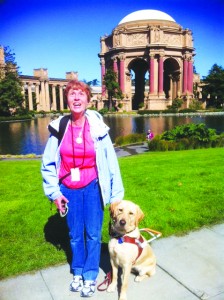I’m blond with brown eyes, cute, energetic and two years old. I am Regina the new female yellow Labrador guide dog for Sun City resident Mary Kozy, and I’d like to tell you a little about myself.
I am very special and smart – if I do say so myself. I was bred and born to be a guide dog. Only 50 percent of those at my Guide Dogs for the Blind kennels in San Rafael California “make it” to be guide dogs. When I was weaned, I was tested to see how I reacted to noises, different surfaces, people, other animals, and handling. After passing those tests with flying colors, I was given to puppy raisers who cared for me until I was ready for formal training, or what we call “doggie college.”
In the raiser’s home in Modesto, Ca., I learned good house manners living with a family, accompanied my puppy-raise
r to high school, learned to behave in class (better than some of the other kids), went to basketball games, took a trip to San Francisco to ride on a train, had classes with other guides-to-be, and went to the county fair.
At about 15 months, I returned to the Guide Dogs for the Blind school and was tested again and given health screenings to see if I had what it took to become a successful guide dog. My formal training consisted of learning to guide in a harness, clear space on my right side for my blind person to keep them safe walking around obstacles like flower boxes and telephone poles. I even learned to look up to clear those low hanging branches. I was trained to stop at curbs, ramps, and stairs and wait to be requested to go forward.
A very unique thing I learned is called “intelligent disobedience.” If my blind person gives me a command to go “forward” and it is not safe to proceed, I will not go. So if there is a car across the path or a car runs a red light I will refuse the command to keep us both safe.
All the other times, my partner and I work as a team. My partner knows the directions and I respond to right, left, forward, and halt. I am only two so I am still learning and let me tell you, there is a lot to learn to be a guide dog.
The most important thing about a guide dog team is to not interfere with our work. It is disruptive to our efficient team, if people try to distract me by talking to me, feeding me, or petting me. Although I am extremely friendly, it would be dangerous for me not to be paying attention to Mary. I am a “dog” after all. If I cannot do my job because I have lost focus or get attacked by someone’s loose pet dog, I will have to be “career changed” and Mary will have to train with a new $60,000 guide.
When I am not in my harness, though, I can kick back just like a “regular” dog, and I can play with anyone and do most things other dogs can do. I love tug toys, Nyla bones, and my Kong. I can’t play Frisbees as this could cause a back injury, and I can’t eat people food because I have to stay healthy to work with Mary. But come see me when I am out of harness, and I’m ready to play!
It is a wonderful job. I get to go places most dogs can’t. Guide dogs are allowed to go anywhere the public goes, which includes hospitals, restaurants, hotels, stores, airplanes, and buses. You may have seen me at Prairie Lodge or Meadowview, Jewel, Wal-Mart, Walgreens, Jamesons, the bank, or walking in the neighborhoods of Sun City. We love to walk.
Stay tuned and maybe Mary will tell you about our two weeks of intensive training with me at Guide dogs for the Blind.
By Regina as told to Mary Kozy
For more information contact:
Guide Dogs for the Blind
P.O. Box 151200
San Rafael, CA 94915
Phone: 800-295-4050
Website: www.guidedogs.com





